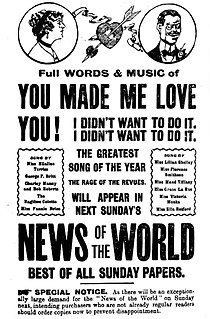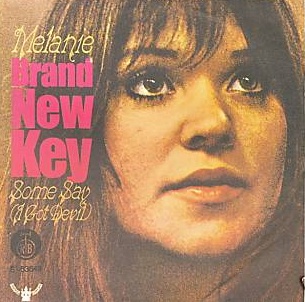Star Trek: Enterprise, titled simply Enterprise for its first two seasons, is an American science fiction television series created by Rick Berman and Brannon Braga. It originally aired from September 26, 2001, to May 13, 2005, on UPN. The sixth series in the Star Trek franchise, it is a prequel to Star Trek: The Original Series, set in the 22nd century, a hundred years before the events of The Original Series and just prior to the formation of the United Federation of Planets. It follows the adventures of the Enterprise, Earth's first starship capable of traveling at warp five, as it explores the galaxy and encounters various alien species.

Julie Anne Miller is a songwriter, singer, and recording artist currently living in Nashville, Tennessee. She married Buddy Miller in 1981. They sing and play on each other's solo projects and have recorded three duet albums.

Anthony Newley was an English actor, singer and songwriter. Newley achieved success as a performer in such diverse fields as rock and roll and stage and screen acting. As a recording artist he enjoyed a dozen Top 40 entries on the UK Singles Chart between 1959 and 1962, including two number one hits. With songwriting partner Leslie Bricusse, Newley wrote "Feeling Good", which was popularised by Nina Simone and covered by many other popular artists, as well as the lyrics for the title song of 1964 film Goldfinger. Bricusse and Newley received an Academy Award nomination for the film score of Willy Wonka & the Chocolate Factory (1971).

Jerrald King Goldsmith was an American composer and conductor, most known for his work in film and television scoring. He composed scores for five films in the Star Trek franchise and three in the Rambo franchise, as well as for Logan's Run, Planet of the Apes, Patton, Chinatown, Poltergeist, Gremlins, Hoosiers, Total Recall, Air Force One, L.A. Confidential, Mulan, and The Mummy. In May 1997, with the release of The Lost World: Jurassic Park, he gained more popularity with his fanfare of the 1997 Universal Studios opening logo and the short version of the fanfare for its television arms, which would be among the most iconic studio logo music of all-time.
"Broken Bow" is the two-part pilot episode of the science fiction television series Enterprise. It originally aired as a double-length episode and released as such, but was split into two segments for syndication. It is the first Star Trek episode in the Prequel-Era. A novelization of the episode, written by Diane Carey, was published in 2001. The episode won the 2002 Emmy Award for Outstanding Special Visual Effects for a Series, and was also nominated for sound editing and make-up.

James Roy Horner was an American composer, conductor and orchestrator of over 100 film scores. He was known for the integration of choral and electronic elements, and for his frequent use of motifs associated with Celtic music.

Ol' Yellow Eyes Is Back is an album by Brent Spiner, best known for his role as Data in the American television series Star Trek: The Next Generation, first released in June 1991. The title is a parodic reference both to Frank Sinatra's Ol' Blue Eyes Is Back and the Data character, whose eyes are golden yellow. On the album, Spiner is backed by the orchestra from that series as he sings a number of old pop standards, mostly from the 1930s and 1940s.
Dennis McCarthy is an American composer of television and film scores. Highly prolific, his soundtrack credits include several entries in the Star Trek franchise, including underscores for The Next Generation,Deep Space Nine, Voyager, Enterprise, and the 1994 feature film Star Trek Generations. His other television credits include Dynasty, V, MacGyver, Sliders, Dawson's Creek, and Project Greenlight. He also produced the album Ol' Yellow Eyes Is Back by Brent Spiner also from Star Trek, and composed music for stage productions.
The "Theme from Star Trek" is an instrumental musical piece composed by Alexander Courage for Star Trek, the science fiction television series created by Gene Roddenberry and originally aired between September 8, 1966, and June 3, 1969.
Ronald Jones is an American composer who has written music for television shows, including Star Trek: The Next Generation,DuckTales, American Dad!, and Family Guy. He composed the theme song for Nickelodeon's The Fairly OddParents with series creator Butch Hartman, and the music for the show's pilots. He lives in Stanwood, Washington, where he opened SkyMuse studios, a recording facility designed for post-production and music recording.

"You Made Me Love You " is a popular song from the year 1913 written by James V. Monaco with the lyrics being written by Joseph McCarthy. It was introduced by Al Jolson in the Broadway revue The Honeymoon Express (1913) and used in the 1973 revival of the musical Irene.
"The Third Man Theme" is an instrumental written and performed by Anton Karas for the soundtrack to the 1949 film The Third Man.

Encore, released in 2002, is the second album by British tenor Russell Watson.

"Brand New Key" is a pop song written and sung by folk music singer Melanie. Initially a track of Melanie's album Gather Me, produced by Melanie's husband Peter Schekeryk, it was known also as "The Rollerskate Song" due to its chorus. It was her greatest success, scoring No. 1 on the Billboard Hot 100 singles chart during December 1971 and January 1972. Billboard ranked it as the No. 9 song of 1972. It also scored No. 1 in Canada and Australia and No. 4 on the UK Singles Chart.

"Superman" is a song by American band Lazlo Bane from their album All the Time in the World. It is most noted for being the theme song to the American TV series Scrubs.

"Faith of the Heart" is a song written by Diane Warren and performed by Rod Stewart for the soundtrack to the 1998 film Patch Adams. Stewart's version charted at number 3 on the US Hot Adult Contemporary Tracks and at number 60 on the UK Singles Chart. It was warmly received by critics. The song was later covered in 1999 by Susan Ashton for her album Closer and released as her first single in the country music genre.
Star Trek: The Music is conducted by Erich Kunzel of the Cincinnati Pops Orchestra, and hosted/narrated by John de Lancie and Robert Picardo.
"Take These Chains from My Heart" is a song by Hank Williams. It was written by Fred Rose and Hy Heath and was recorded at Williams' final recording session on September 23, 1952, in Nashville. The song has been widely praised; Williams' biographer Colin Escott deems it "perhaps the best song [Rose] ever presented to Hank...It was one of the very few songs that sounded somewhat similar to a Hank Williams song." Williams is backed by Tommy Jackson (fiddle), Don Helms, Chet Atkins, Jack Shook, and Floyd "Lightnin'" Chance (bass). In the wake of Williams' death on New Year's Day, 1953, the song shot to No. 1, his final chart-topping hit for MGM Records. Like "Your Cheatin' Heart," the song's theme of despair, so vividly articulated by Williams' typically impassioned singing, reinforced the image of Hank as a tortured, mythic figure.
Larry (Alvin) Franklin is an American fiddle, mandolin and guitar player, session musician, and composer. His style embraces country, blues, rock & roll, jazz, and Western swing.










